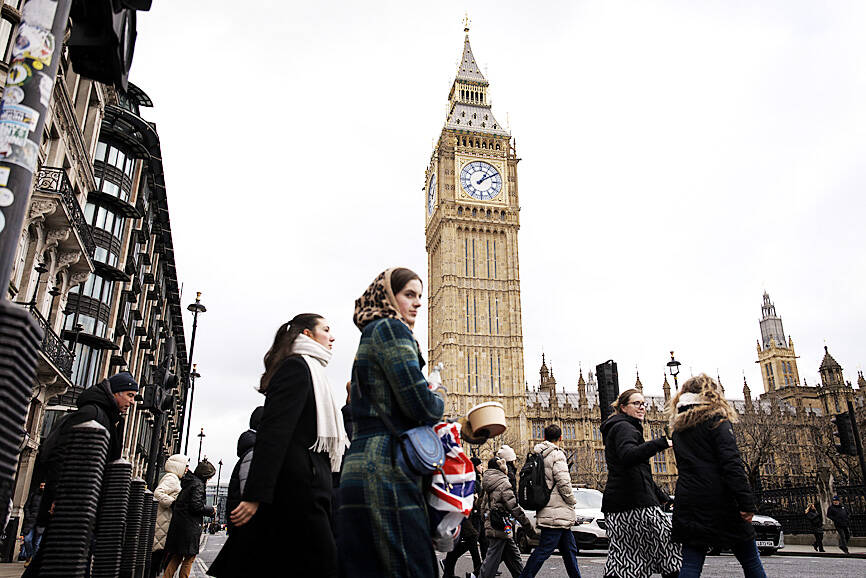UK businesses have run down a mountain of cash reserves built up during the COVID-19 pandemic, leaving them more likely to cut jobs when the Labour Party’s tax hikes come into effect in April.
Firms added more than £150 billion (US$187.19 billion) to their savings when the economy was placed under COVID-19 restrictions, thanks to a mix of loans and large-scale public-sector support.
Corporate coffers reached almost double the value of their quarterly wage bills, a Bloomberg analysis of official data showed.

Photo: EPA-EFE
However, most of those excess reserves are now gone. Firms tapped into them during the cost-of-living crisis to keep up with inflation-busting pay rises, including double-digit increases in the minimum wage, and high borrowing costs.
The ratio of savings to payroll bills is now back to its pre-COVID-19 level of just above 1.5.
“It’s the corporate equivalent of households’ excess savings being eroded by high inflation last year,” EY ITEM Club chief economic adviser Matt Swannell said. “With some reserves, it’s easier to keep hold of staff even if they are expensive. In real terms though, if your savings have depleted, that becomes harder to do.”
Businesses complained vociferously after British Chancellor of the Exchequer Rachel Reeves increased a payroll tax by about £26 billion a year in her Oct. 30 budget. Reeves has insisted the tax rise would go ahead in April, blaming the previous Conservative government for leaving a £22 billion hole in the public finances.
Firms have already started to reduce headcount, as they brace not only for the hike in national insurance contributions, but also a third consecutive increase in the minimum wage that also takes effect in April.
The pace of job-cutting in January and December was the fastest since the wake of the 2008 global financial crisis, barring the COVID-19 pandemic, a purchasing-management survey published by S&P Global on Friday showed.
Supermarket giant J Sainsbury PLC a day earlier announced 3,000 roles are to go — including a 20 percent reduction in senior management — and that all of its remaining in-store cafes are to close.
HM Revenue & Customs data through last month showed that private-sector employers have shed more than 150,000 employees since Labour took office in July last year, including 70,000 since the budget. Workers in hospitality, retail and manufacturing have borne the brunt.
The run of bad economic headlines piles pressure on the Bank of England to cut interest rates further, with the post-COVID-19 trend of “hoarding” staff in the face of weak demand now apparently over.
Its newest rate-setter, Alan Taylor, recently warned of a “hard landing” and recession if officials act too slowly.
“There is scope for increased unemployment going forward,” Swannell said.

Taiwan Semiconductor Manufacturing Co (TSMC, 台積電) would not produce its most advanced technologies in the US next year, Minister of Economic Affairs J.W. Kuo (郭智輝) said yesterday. Kuo made the comment during an appearance at the legislature, hours after the chipmaker announced that it would invest an additional US$100 billion to expand its manufacturing operations in the US. Asked by Taiwan People’s Party Legislator-at-large Chang Chi-kai (張啟楷) if TSMC would allow its most advanced technologies, the yet-to-be-released 2-nanometer and 1.6-nanometer processes, to go to the US in the near term, Kuo denied it. TSMC recently opened its first US factory, which produces 4-nanometer

PROTECTION: The investigation, which takes aim at exporters such as Canada, Germany and Brazil, came days after Trump unveiled tariff hikes on steel and aluminum products US President Donald Trump on Saturday ordered a probe into potential tariffs on lumber imports — a move threatening to stoke trade tensions — while also pushing for a domestic supply boost. Trump signed an executive order instructing US Secretary of Commerce Howard Lutnick to begin an investigation “to determine the effects on the national security of imports of timber, lumber and their derivative products.” The study might result in new tariffs being imposed, which would pile on top of existing levies. The investigation takes aim at exporters like Canada, Germany and Brazil, with White House officials earlier accusing these economies of

GREAT SUCCESS: Republican Senator Todd Young expressed surprise at Trump’s comments and said he expects the administration to keep the program running US lawmakers who helped secure billions of dollars in subsidies for domestic semiconductor manufacturing rejected US President Donald Trump’s call to revoke the 2022 CHIPS and Science Act, signaling that any repeal effort in the US Congress would fall short. US Senate Minority Leader Chuck Schumer, who negotiated the law, on Wednesday said that Trump’s demand would fail, while a top Republican proponent, US Senator Todd Young, expressed surprise at the president’s comments and said he expects the administration to keep the program running. The CHIPS Act is “essential for America leading the world in tech, leading the world in AI [artificial

REACTIONS: While most analysts were positive about TSMC’s investment, one said the US expansion could disrupt the company’s supply-demand balance Taiwan Semiconductor Manufacturing Co’s (TSMC, 台積電) new US$100 billion investment in the US would exert a positive effect on the chipmaker’s revenue in the medium term on the back of booming artificial intelligence (AI) chip demand from US chip designers, an International Data Corp (IDC) analyst said yesterday. “This is good for TSMC in terms of business expansion, as its major clients for advanced chips are US chip designers,” IDC senior semiconductor research manager Galen Zeng (曾冠瑋) said by telephone yesterday. “Besides, those US companies all consider supply chain resilience a business imperative,” Zeng said. That meant local supply would